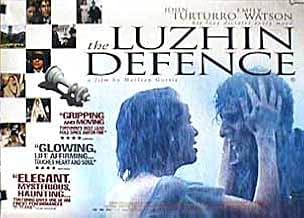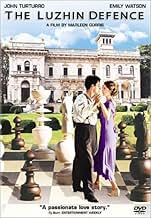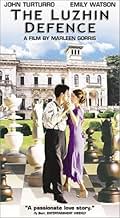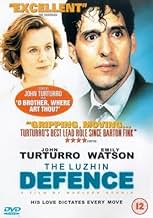CALIFICACIÓN DE IMDb
6.8/10
5 k
TU CALIFICACIÓN
Agrega una trama en tu idiomaTwo worlds collide when an eccentric genius falls in love with a strong-willed society beauty.Two worlds collide when an eccentric genius falls in love with a strong-willed society beauty.Two worlds collide when an eccentric genius falls in love with a strong-willed society beauty.
- Dirección
- Guionistas
- Elenco
- Premios
- 3 premios ganados y 2 nominaciones en total
- Dirección
- Guionistas
- Todo el elenco y el equipo
- Producción, taquilla y más en IMDbPro
Opiniones destacadas
As a costume drama, this movie is a success.
The decor is marvelous, the dialogues intense and the acting of top-level.
But as a chess film this makes absolutely no sense.
It's like a film about a chef cook that tries to combine salmon with rice cakes or pancake syrup.
On the other hand, it is nice that it introduces the audience to some concepts of chess - chess notation (the 'recipe') and some ingredients like the isolated queen's pawn, quiet moves, mating net, and rook sacrifice.
But as a chess player I can confirm that the board setups don't make any sense. One of the rook moves is illegal since it's pinned.
And in the final game, only an amateur would play gxh3 after Rh3. Because any professional would see that trap. With a piece up there are plenty of good moves for white, for example the bishop is hanging. No way black can win that.
In other words, the movie is called Luzhin Defense but there is no Luzhin Defense. That's what the chess player is watching for!
So that's basically the only criticism I have: if you make a chess film, the chess has to be correct. And to show a world-champion level game, the true brilliance has to be found. Because to us this is a scam.
It's not that hard with plenty of chess coaches and computer engines around. They should have done a bit more consulting with John Speelman at the time if the rook sac is all he was able to give them!
The decor is marvelous, the dialogues intense and the acting of top-level.
But as a chess film this makes absolutely no sense.
It's like a film about a chef cook that tries to combine salmon with rice cakes or pancake syrup.
On the other hand, it is nice that it introduces the audience to some concepts of chess - chess notation (the 'recipe') and some ingredients like the isolated queen's pawn, quiet moves, mating net, and rook sacrifice.
But as a chess player I can confirm that the board setups don't make any sense. One of the rook moves is illegal since it's pinned.
And in the final game, only an amateur would play gxh3 after Rh3. Because any professional would see that trap. With a piece up there are plenty of good moves for white, for example the bishop is hanging. No way black can win that.
In other words, the movie is called Luzhin Defense but there is no Luzhin Defense. That's what the chess player is watching for!
So that's basically the only criticism I have: if you make a chess film, the chess has to be correct. And to show a world-champion level game, the true brilliance has to be found. Because to us this is a scam.
It's not that hard with plenty of chess coaches and computer engines around. They should have done a bit more consulting with John Speelman at the time if the rook sac is all he was able to give them!
Walking home after the film, I was humming the familiar waltz music that Natalia and Alexandre were dancing to. I've heard that before - where? Ah, from Kubrick's "Eyes Wide Shut" (track 2), 'got it just as I arrived at the door. It's "Waltz No. 2 from Jazz Suite No. 2" composed by Dimitri Shostakovich, performed here by The City of Prague Philharmonic Orchestra. Yes, I went and picked up the soundtrack from Tower's. What a treat! The film score by Alexandre Desplat was fulfilling - there are fifteen tracks besides two tracks of the delightful waltz. It's not often these days we get a soundtrack entirely dedicated to a comprehensive film score. Reminds me of favorite scores by Maurice Jarre, Ennio Morricone (beginning notes of track 6 have traces of "Nuovo cinema Paradiso"), Georges Delerue, and John Barry. There are subtle nuances of strains and notes from the strings, celeste, piano, and harp.
Emily Watson and John Turturro delivered a credibly consuming paired performance. The love story, their intimate connection, is very much between Alexandre and Natalia - his childlike yet tormenting inner world, and her generous and bold understanding of him - a relationship alone to them both. Director Marleen Gorris of "Antonia's Line" (1996 Academy Award's Best Foreign Language Film from the Netherlands) gave us a quietly sensitive film - not without its unsettling human conflicts, intrigues, obsessions, family strives, lovingness and respect. The front-end subject is the mind-game and mathematical logic of chess. Beneath it can be a mild tearjerker of a drama set in the late 1920's. Cinematography captures the serene beauty of Lake Como in northern Italy near the Swiss border.
I highly recommend the soundtrack if you don't feel like going to the movies. Alexandre Desplat's lyrical film score of "The Luzhin Defence" is complete.
Emily Watson and John Turturro delivered a credibly consuming paired performance. The love story, their intimate connection, is very much between Alexandre and Natalia - his childlike yet tormenting inner world, and her generous and bold understanding of him - a relationship alone to them both. Director Marleen Gorris of "Antonia's Line" (1996 Academy Award's Best Foreign Language Film from the Netherlands) gave us a quietly sensitive film - not without its unsettling human conflicts, intrigues, obsessions, family strives, lovingness and respect. The front-end subject is the mind-game and mathematical logic of chess. Beneath it can be a mild tearjerker of a drama set in the late 1920's. Cinematography captures the serene beauty of Lake Como in northern Italy near the Swiss border.
I highly recommend the soundtrack if you don't feel like going to the movies. Alexandre Desplat's lyrical film score of "The Luzhin Defence" is complete.
Part of the enjoyment that I took from this film stemmed from the fact that I knew nothing more about it than that it starred John Turturro and Emily Watson (2 reasons enough to watch), was a period piece and involved chess. Everything that evolved before me was completely unexpected. I shan't, therefore, give away much more. Suffice to say that Turturro is magnificent as an eccentric, obsessive and deeply vulnerable chess genius and Em matches him step for step as the strong-minded woman who is drawn to him. It's about love and obsession, rather than the venerated board game and after drawing me in gradually over the first half hour, became totally compelling. And I defy anyone to second-guess the ending.
A movie of outstanding brilliance and a poignant and unusual love story, the Luzhin Defence charts the intense attraction between an eccentric genius and a woman of beauty, depth and character.
It gives John Turturro what is probably his finest role to date (thank goodness they didn't give it to Ralph Fiennes, who would have murdered it.) Similarly, Emily Watson shows the wealth of her experience (from her outstanding background on the stage). To reach the tortured chess master (Turturro) her character has to display intelligence as well as a woman's love. Watson does not portray beauty-pageant sexuality, but she brings to her parts a self-awareness that is alluring.
In a chance meeting between Natalia (Watson) and Luzhin, she casually stops him from losing a chess piece that has fallen through a hole in his clothing - a specially crafted piece that, we realize later in the film, has come to symbolize his hopes and aspirations. Later, as their love affair develops, she subtly likens dancing to chess (Luzhin has learnt to dance but never with a partner); she encourages him to lead her with "bold, brilliant moves" and in doing so enables him to relax sufficiently to later play at his best (and also realize himself as her lover).
This is a story of a woman who inspires a man to his greatest achievement and, in so doing finds her own deepest fulfillment, emotionally and intellectually (Or so we are led to believe - certainly, within the time frame, Natalia is something of a liberated woman rather than someone who grooms herself to be a stereotypical wife and mother).
The Italian sets are stunning. The complexity of the characters and the skill with which the dialogue unfolds them is a delight to the intelligent movie-goer, yet the film is accessible enough to make it a popular mainstream hit, and most deservedly so. Chess is merely the photogenic backdrop for developing an emotional and emotive movie, although the game is treated with enough respect to almost convince a chess-player that the characters existed. Although a tragedy of remarkable heights by a classic author, the final denouement is nevertheless surprisingly uplifting.
It gives John Turturro what is probably his finest role to date (thank goodness they didn't give it to Ralph Fiennes, who would have murdered it.) Similarly, Emily Watson shows the wealth of her experience (from her outstanding background on the stage). To reach the tortured chess master (Turturro) her character has to display intelligence as well as a woman's love. Watson does not portray beauty-pageant sexuality, but she brings to her parts a self-awareness that is alluring.
In a chance meeting between Natalia (Watson) and Luzhin, she casually stops him from losing a chess piece that has fallen through a hole in his clothing - a specially crafted piece that, we realize later in the film, has come to symbolize his hopes and aspirations. Later, as their love affair develops, she subtly likens dancing to chess (Luzhin has learnt to dance but never with a partner); she encourages him to lead her with "bold, brilliant moves" and in doing so enables him to relax sufficiently to later play at his best (and also realize himself as her lover).
This is a story of a woman who inspires a man to his greatest achievement and, in so doing finds her own deepest fulfillment, emotionally and intellectually (Or so we are led to believe - certainly, within the time frame, Natalia is something of a liberated woman rather than someone who grooms herself to be a stereotypical wife and mother).
The Italian sets are stunning. The complexity of the characters and the skill with which the dialogue unfolds them is a delight to the intelligent movie-goer, yet the film is accessible enough to make it a popular mainstream hit, and most deservedly so. Chess is merely the photogenic backdrop for developing an emotional and emotive movie, although the game is treated with enough respect to almost convince a chess-player that the characters existed. Although a tragedy of remarkable heights by a classic author, the final denouement is nevertheless surprisingly uplifting.
John Turturro, Emily Watson, Geraldine James, Stuart Wilson; directed by Marleen Gorris, loosely based on the novel by Vladimir Nabokov The Luzhin Defence is set in nineteen-twenties Italy's lake district where the world championships of Chess are being staged. Our hero Luzhin (Turturro) is a main contender for the title and recognized as one of the greatest chess minds of the era. He is utterly consumed by game, and has utterly devoted his life to the contest since a young age. It has been both obsession and addiction for the man, as it is both all he knows and what gives his life meaning. While competing in the championships, he meets Natalia (Watson), a wealthy socialite. Showing his peculiarity, he immediately asks her to marry him, sight unseen. Intrigued by his straight forward manner, she does not immediately dismiss him.
This is due to the fact that she is here for her mother to choose a suitor for her, and Luzhin's eccentricity is seen by her as a welcome change. Her mother (James) is completely taken aback by such an idea, and wants her daughter to marry someone of similar prestige and means. All of this transpires while his old chess teacher (Wilson) tutors his chief rival, wanting nothing more than to see Luzhin humiliated.
Being a chess movie, it could immediately be set aside as dull and unwatchable, being as Chess is not exactly a spectator sport.
However, this movie is much less about chess and much more about the people surrounding the game; making it a piece about the interactions of personalities and not pieces. The movie does find a parallel however, as it is shown like a chess match between two sides, the present and the past (shown through flashbacks), with one side prevailing at the end. This storytelling choice works surprisingly well, as we gain much insight as to why Luzhin is the way he is, and how he views the world.
The movie begins with a telling piece of cinematography, as the audience is given the perspective of a train conductor emerging from a tunnel. This is especially significant when viewed in the sense of Luzhin's later mental breakdown, and can be seen as meaning the same thing. This scene is then segued into the first flashback, giving us a pattern that can be seen in the rest of the film. Other notable scenes include the meeting of Natlalia and Alexander at a tennis court, and later when he is thinking to himself in their bedroom, "There is a pattern emerging!" cries the eccentric chess genius Alexander Luzhin. "I must keep track--every second!" To which Natalia, whom he loves can only reply, "It sounds like such a lonely battle.' This all encompassing effect of chess on him can also be seen earlier in the film, as he is being driven by one of his old chess teachers chauffeurs into the middle of the countryside, is dropped off there, and does not notice. The end adds character to the film without being overly dramatic, but is a departure from the finish of the novel, however it is believable and adds to the sense that Luzhin does not really control himself, or know how.
Overall an enjoying piece of film, more about camera angles and people then chess. After the first half, the films pace drastically speeds up, and the plot becomes much more intriguing. Can best be compared to other independent films of its ilk, yet also suffices quite well as a period piece. Probably not a buy, but a worthy rental for an evening at home.
This is due to the fact that she is here for her mother to choose a suitor for her, and Luzhin's eccentricity is seen by her as a welcome change. Her mother (James) is completely taken aback by such an idea, and wants her daughter to marry someone of similar prestige and means. All of this transpires while his old chess teacher (Wilson) tutors his chief rival, wanting nothing more than to see Luzhin humiliated.
Being a chess movie, it could immediately be set aside as dull and unwatchable, being as Chess is not exactly a spectator sport.
However, this movie is much less about chess and much more about the people surrounding the game; making it a piece about the interactions of personalities and not pieces. The movie does find a parallel however, as it is shown like a chess match between two sides, the present and the past (shown through flashbacks), with one side prevailing at the end. This storytelling choice works surprisingly well, as we gain much insight as to why Luzhin is the way he is, and how he views the world.
The movie begins with a telling piece of cinematography, as the audience is given the perspective of a train conductor emerging from a tunnel. This is especially significant when viewed in the sense of Luzhin's later mental breakdown, and can be seen as meaning the same thing. This scene is then segued into the first flashback, giving us a pattern that can be seen in the rest of the film. Other notable scenes include the meeting of Natlalia and Alexander at a tennis court, and later when he is thinking to himself in their bedroom, "There is a pattern emerging!" cries the eccentric chess genius Alexander Luzhin. "I must keep track--every second!" To which Natalia, whom he loves can only reply, "It sounds like such a lonely battle.' This all encompassing effect of chess on him can also be seen earlier in the film, as he is being driven by one of his old chess teachers chauffeurs into the middle of the countryside, is dropped off there, and does not notice. The end adds character to the film without being overly dramatic, but is a departure from the finish of the novel, however it is believable and adds to the sense that Luzhin does not really control himself, or know how.
Overall an enjoying piece of film, more about camera angles and people then chess. After the first half, the films pace drastically speeds up, and the plot becomes much more intriguing. Can best be compared to other independent films of its ilk, yet also suffices quite well as a period piece. Probably not a buy, but a worthy rental for an evening at home.
¿Sabías que…?
- TriviaLa Estrategia De Luzhin (2000) was shot entirely in Europe. Budapest, Hungary was used for outdoor scenes as they were set in St Petersburg, these included the Széchenyi Chain Bridge, Hungarian National Museum and Heroes' Square. The chess tournament (although in Italy) was shot inside the main hall of the Museum of Ethnography, Budapest. In Italy, the hotel scenes were filmed at Villa Erba, Cernobbio, on the Lake Como. The scene at the railway station is in Brenna-Alzate, near Como.
- ErroresIn his game as white against an unnamed opponent before the final, Luzhin is shown supposedly checkmating with Rd1-d8, which is an illegal move because his rook at d1 is pinned against his king on h1 by black's rook at c1.
- Citas
Aleksandr Ivanovich Luzhin: There's a pattern emerging, a definite pattern. Not Turati. I repeat that game. I've beaten him. And his moves are repeated, repeated, repeated moves. I must keep track... of every second. Every second I must keep track of, every second.
Natalia Katkov: It sounds like such a lonely battle.
- Bandas sonorasJazz Suite No. 2: VI. Waltz 2
Written by Dmitri Shostakovich (as Dimitri Shostakovich)
Performed by Koninklijk Concertgebouworkest (as Royal Concertgebouw Orchestra)
Conducted by Riccardo Chailly
By permission of Boosey & Hawkes Licensing
Courtesy of Decca Record Label Ltd.
Under license from Universal Special Markets
(p) 1992 Decca Records
Selecciones populares
Inicia sesión para calificar y agrega a la lista de videos para obtener recomendaciones personalizadas
- How long is The Luzhin Defence?Con tecnología de Alexa
Detalles
- Fecha de lanzamiento
- Países de origen
- Idiomas
- También se conoce como
- The Luzhin Defence
- Locaciones de filmación
- Budapest, Hungría(St Petersburg scenes)
- Productoras
- Ver más créditos de la compañía en IMDbPro
Taquilla
- Total en EE. UU. y Canadá
- USD 1,053,070
- Fin de semana de estreno en EE. UU. y Canadá
- USD 63,203
- 22 abr 2001
- Total a nivel mundial
- USD 1,873,620
- Tiempo de ejecución
- 1h 49min(109 min)
- Color
- Mezcla de sonido
- Relación de aspecto
- 1.85 : 1
Contribuir a esta página
Sugiere una edición o agrega el contenido que falta





























